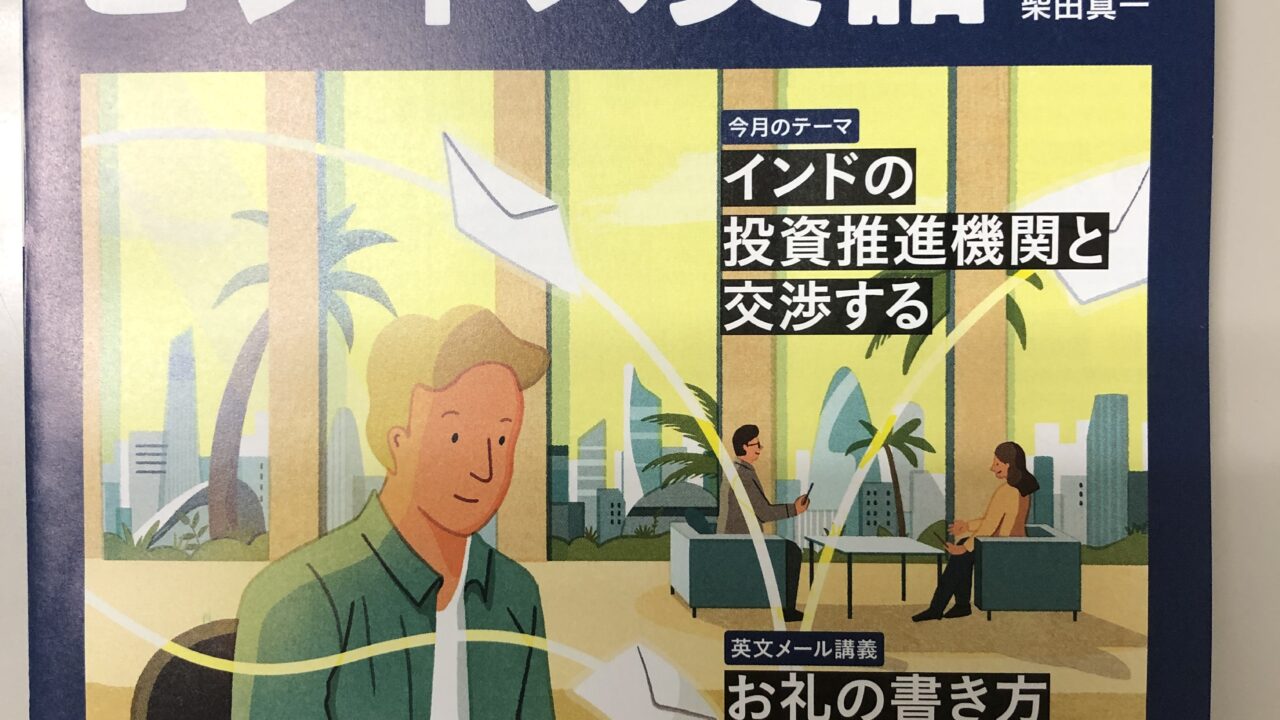【ラジオビジネス英語】Lesson 37 チェンナイ市内に入る

July 4 Monday, 2022
January 2 Monday, 2023
Lesson 37 チェンナイ市内に入る
★Words and Phrases
**downtown:
We’re entering downtown!
**scary:
It was so scary to drive the narrow roads in Tokyo, but this is a different game.
**random:
**mean nothing:
Everything’s so sudden and random! The lanes mean nothing here.
**scratch:
**bump:
If this car survives a week without a scratch or a bump, I’ll give you a medal.
**tailgate:
Oh my god, we’re being tailgated.
**intent:
There’s no bad intent – this is just the way everyone drives here.
**honk:
**horn:
Why do they honk all the time? Do they have horns attached to the brake pedal?
★Business Phrase of the Day
You need to show other drivers that you’re not giving way.
give way「道を譲る」というフレーズ。一般的には「取って代わられる」という意味。
A give way to B で「A が B に道を与える」
You must give way to buses when they’re leaving the bus stop.
Make sure you give way to cars coming from the right at a roundabout.
**roundabout:
Telephone calls are giving way to emails, particularly in business.
**particularly:
★Alternative Expressions
「道を譲る」に関するフレーズ
yield to:
Watch out! You have to stop and yield to pedestrians here.
**pedestrian:
let ~ past:
Let the oncoming car past.
**oncoming:
make way for ~:
I stopped to make way for a truck to go past.
★Upgrade Your Communication Skills
カルチャーショックについて語る
異文化に関わる新鮮な驚きや気づきは、会話ネタの一つ。固定観念でとらえすぎず、相手の国や地域を尊重する姿勢を。
☆Dialogue☆
A: In Indian films, there’s almost always a very long dance scene. I’ve heard that in cinemas, when a dancing scene begins, the audience stands up and start screaming and dancing. Am I exaggerating a bit?
B: No, not at all. Song and dance are central to the daily lives of all Indians. As there are a lot of languages spoken in India, song and dance are used as common methods of emotional expression. Without dance, a movie would be incomplete.
**almost always:
**exaggerate:
**common method:
**emotional expression:
**incomplete:
July 4 Monday, 2022
January 2 Monday, 2023
Lesson 37 チェンナイ市内に入る
(日本語訳・解説付き)
★Words and Phrases
**downtown: 市街地、商業地区、繁華街、ビジネス街、中心街
We’re entering downtown!
市街地に入ってきましたね!
**scary: 怖い、恐ろしい
It was so scary to drive the narrow roads in Tokyo, but this is a different game.
東京の狭い道をドライブするのは怖かったけど、これは状況が全く違います。
**random: でたらめの、乱雑な
**mean nothing: なにも意味しない
Everything’s so sudden and random! The lanes mean nothing here.
全てが突然で秩序がありません!ここでは車線は何の意味もないです。
**scratch: すり傷、ひっかき傷
**bump: ぶつかること、(車の)軽い衝突事故
If this car survives a week without a scratch or a bump, I’ll give you a medal.
もしこの車が1週間すり傷ぶつかることもなく生き延びたら、私はあなたにメダルをあげます。=この車が1週間、傷ひとつつけず、ぶつかることなく走れたらメダルをあげますよ。
**tailgate: 前の車の後ろにピッタリついて走る(車間が狭い状態のこと)
Oh my god, we’re being tailgated.
おっと、後ろの車がぴったりついてきますね。
**intent: 意図
There’s no bad intent – this is just the way everyone drives here.
悪意はありません – これがここでの運転の仕方なんですよ。
**honk: クラクションを鳴らす
**horn: クラクション
Why do they honk all the time? Do they have horns attached to the brake pedal?
なぜ彼らはいつもクラクションを鳴らすのか?ブレーキペダルにクラクションが付いているのでしょうか?
★Business Phrase of the Day
You need to show other drivers that you’re not giving way.
道を譲っていないことを、他のドライバーに示す必要があります。
give way「道を譲る」というフレーズ。一般的には「取って代わられる」という意味。
A give way to B で「A が B に道を与える」
You must give way to buses when they’re leaving the bus stop.
バスがバス停を離れるときには、(バスに)道を譲らなければなりません。
Make sure you give way to cars coming from the right at a roundabout.
ロータリーでは右から来る車に必ず道を譲ってください。
※イギリスでの話、でした!
**roundabout: 環状/円形交差点、回り道
Telephone calls are giving way to emails, particularly in business.
特にビジネスでは、電話はメールに取って代わられつつあります。
**particularly: 特に
★Alternative Expressions
「道を譲る」に関するフレーズ
yield to: ~に譲る、譲歩する
Watch out! You have to stop and yield to pedestrians here.
気を付けて!ここでは停止して、歩行者に道を譲らなければダメですよ。
**pedestrian: 歩行者
let ~ past: ~を先に行かせる
Let the oncoming car past.
対向車を先に行かせましょう。
**oncoming:(車両・車線が)対向の
make way for ~: ~に道を空ける
I stopped to make way for a truck to go past.
いったん停車して、トラックに道を空けて先に行かせました。
★Upgrade Your Communication Skills
カルチャーショックについて語る
異文化に関わる新鮮な驚きや気づきは面白い会話ネタの一つ。固定観念でとらえすぎず、相手の国や地域を尊重する姿勢を。
☆Dialogue☆
A: In Indian films, there’s almost always a very long dance scene. I’ve heard that in cinemas, when a dancing scene begins, the audience stands up and start screaming and dancing. Am I exaggerating a bit?
インドの映画では必ずと言っていいほど、非常に長いダンスシーンがありますよね。映画館では、踊りのシーンになると観客が立ち上がって絶叫しながら踊り出す、と聞きました。ちょっと誇張しすぎでしょうか?
**almost always: 大抵、ほとんどの場合、ほぼ必ず
**exaggerate: (実際以上に)大げさに言う、誇張する、強調しすぎる
B: No, not at all. Song and dance are central to the daily lives of all Indians. As there are a lot of languages spoken in India, song and dance are used as common methods of emotional expression. Without dance, a movie would be incomplete.
いいえ、そんなことはありません。歌と踊りは全てのインド人の日常生活の中心となっています。インドではたくさんの言語が話されているので、歌と踊りは感情表現の共通の方法として使われているのです。ダンスがなければ、映画は不完全なものになってしまいますよ。
**common method: 共通方法
**emotional expression: 感情表現
**incomplete: 不完全な、不十分な



